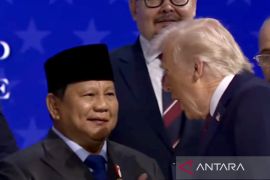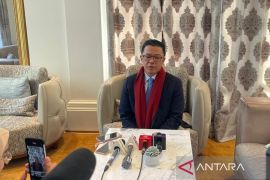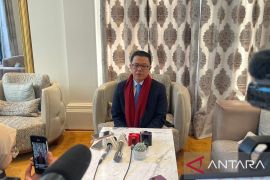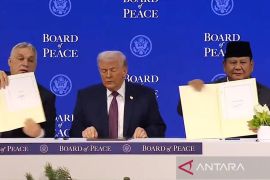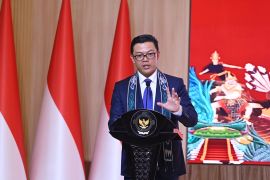Axios (www.axios.com), an American news website, on December 22, 2021, reported that U.S. Secretary of State Antony Blinken had raised the possibility of Indonesia normalizing diplomatic relations with Israel during meetings with officials in Jakarta, December 13 and 14.
The report, however, added that Israeli officials had stressed that no such step was imminent.
The US media outlet also wrote that the Biden administration is trying to build on the Trump-era Abraham Accords, and in this case, looking beyond the Middle East to the largest of the countries that do not recognize Israel.
The Abraham Accords refer to agreements between Israel and four Muslim-majority countries -- the United Arab Emirates, Bahrain, Morocco, and Sudan -- for normalizing relations.
“We are always exploring additional opportunities for normalization, but we’ll leave those discussions behind closed doors until the right moment," State Department spokesperson Ned Price told Axios.
The Indonesian Foreign Ministry later confirmed that Blinken did raise the issue during talks with Indonesian Foreign Affairs Minister Retno LP Marsudi.
The ministry's spokesperson, Teuku Faizasyah, told the media on December 24 that during the meeting, Marsudi "conveyed Indonesia's consistent position towards Palestine that Indonesia will continue, with the Palestinian people, to fight for justice and independence."
This stance is in accordance with the policy of President Joko Widodo (Jokowi), who has affirmed that Indonesia will continue to stand with the Palestinian people until the day they gain independence.
Related news: Indonesia remains firm in supporting Palestine: Minister Marsudi
Indonesia has consistently supported Palestine's claims, the President said while speaking at the UN General Assembly on September 24, 2020.
The consistent stance against colonialism and occupation is in line with the mandate of Indonesia's 1945 Constitution and its Preamble, which states that colonialism must be abolished in this world, he added.
During a bilateral meeting with Palestinian Prime Minister Mohammad Ibrahim Shtayyeh on the sidelines of the Conference of Parties (COP) 26 World Leaders Summit in Glasgow, Scotland, on November 1, 2021, President Jokowi reaffirmed Indonesia's commitment to supporting Palestine's struggle to become an independent, fully sovereign, and self-determined state, with East Jerusalem as its capital.
"Palestine has always been an important concern for Indonesia," the President said, as quoted by the press bureau of the Presidential Secretariat.
Furthermore, the head of state noted that Indonesia has several concerns regarding Palestine.
First, Indonesia is very concerned and condemns the various violations being done by Israel, he said.
Hence, on various occasions, Indonesia has proposed the establishment of an international peacekeeping mission to serve as the international community's "ears" and "eyes" to various incidents occurring in Jerusalem, he explained.
Related news: Palestine issue must not divide Indonesians: Nashir
"In addition, the mission aims to ensure the safety of the residents in the occupied territories and maintain its status as a holy city for three religions (Christianity, Islam, and Judaism)," he affirmed.
Second, Indonesia also encourages credible multilateral negotiations, Jokowi said.
"Indonesia is willing to encourage the Middle East Quartet to restart peace negotiations to achieve a two-state solution that can coexist peacefully," he added.
The quartet is a group of nations, international organizations, and the supranational entity of the United Nations, the United States, the European Union, and Russia, which are mediating the peace negotiations between Palestine and Israel.
President Jokowi pledged that Indonesia will continue to support Palestinians' struggle at various international forums, for instance, the meetings of the United Nations (UN), the Organisation of Islamic Cooperation (OIC), and the Non-Aligned Movement (NAM).
Lastly, the Indonesian President urged Palestine to strengthen unity among Palestinians, saying national unity is crucial to the success of their struggle for independence.
In the meantime, Speaker of the Indonesian House of Representatives (DPR), Puan Maharani, affirmed Indonesia’s support for Palestine's independence and urged all member states of the Non-Aligned Movement (NAM) to pledge their support to the Palestine cause, too.
The House Speaker delivered the statement during the inauguration of the Parliamentary Network of Non-Aligned Movement (NAM) in Madrid, Spain, in November 2021, on the sidelines of the 143rd Inter-Parliamentary Union (IPU) General Assembly.
"The parliaments of member states of the Non-Aligned Movement (NAM) should encourage their respective governments to support Palestine's independence," Maharani said.
NAM countries have jointly sought Palestine's independence since the Bandung Conference in 1955, but the goal has still not been realized, she noted.
Related news: Palestine violence: Protesters call for boycott of US, Israeli goods
"The Bandung Conference principle has mandated NAM countries to support Palestine in their struggle for justice," she added.
Considering the number of member countries (120), NAM has the potential to make a significant contribution to resolving global issues, she said. However, this potential must be interpreted by each member country so it becomes a positive influence and can make a real contribution, she added.
"This requires all of us to be solid and work together in unity," Maharani affirmed.
Recently, an expert on the Middle East at the University of Indonesia (UI), Yon Machmudi, said that the interests of Palestine have become a major consideration for Indonesia in deciding whether to establish diplomatic ties with Israel or not.
This is because the Palestinian cause is part of the main core of Indonesian diplomacy, he added.
"If America and Israel think that normalization (between Indonesia and Israel) is necessary, then it must be balanced with their seriousness in materializing a solution for Palestine’s independence,” Machmudi said.
As long as Palestine is still under the occupation of Israel, establishing diplomatic ties with Israel would trigger domestic political instability in Indonesia, he added.
He said that normalization with Israel must be one package with the independence of Palestine. When Palestine gains its independence, there will be no more reason to deny diplomatic ties with Israel, he added.
Related news: Indonesia looks to EU to resolve Palestine question
Editor: Rahmad Nasution
Copyright © ANTARA 2021

